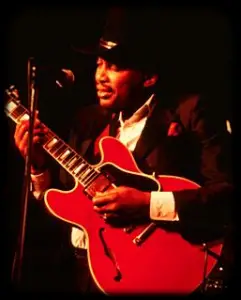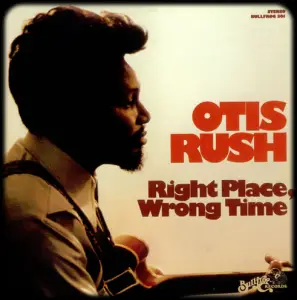OTIS RUSH
 Chicago in the mid-50s was Bluesville. The music of BB King, Elmore James and the ‘Big Beasts’ of the Chess label dominated the Delta based Blues heard in every club on the South-side, but across on the West side of town, a new sound was taking shape. The heavy back-beat behind harp and guitars that characterised early electric Blues was cut with lighter rhythms, more sax than harp, high frenetic vocals and a more fluid, jazzy guitar style. Buddy Guy, Freddie King and Magic Sam were all cutting a dash, but on the razor’s edge was the much under-rated and supremely talented Otis Rush. His emotionally charged singing and playing, especially his intense vibrato-heavy guitar with his painfully spiky solo lines made a huge impact, but ‘bad luck and trouble’ meant he never really became a star of the Blues.
Chicago in the mid-50s was Bluesville. The music of BB King, Elmore James and the ‘Big Beasts’ of the Chess label dominated the Delta based Blues heard in every club on the South-side, but across on the West side of town, a new sound was taking shape. The heavy back-beat behind harp and guitars that characterised early electric Blues was cut with lighter rhythms, more sax than harp, high frenetic vocals and a more fluid, jazzy guitar style. Buddy Guy, Freddie King and Magic Sam were all cutting a dash, but on the razor’s edge was the much under-rated and supremely talented Otis Rush. His emotionally charged singing and playing, especially his intense vibrato-heavy guitar with his painfully spiky solo lines made a huge impact, but ‘bad luck and trouble’ meant he never really became a star of the Blues.
Born in Philadelphia, Mississippi, Otis arrived in Chicago in 1948 aged 14, in search of work in the stockyards. He had a great voice and could blow some harp, but when he saw Muddy Waters play, he took up the guitar. He played left-handed and developed a stripped-down but passionate style, which owed a heavy debt to BB King. Otis was playing around the club scene with Dave and Louis Myers and Mighty Joe Young, when Willie Dixon saw his act at the 708 club and recommended Otis to the Chess Brothers. They did not offer him a deal so in the summer of 1956, when Dixon fell out with Chess and left to join Eli Toscano’s new Cobra label, he took Otis with him. The first Cobra release was ‘I Can’t Quit You’ by Otis, and it stayed in the R&B Top Ten for six weeks. The combination of Willie’s songs and production, Ike Turner‘s band and Otis’s stunning delivery gave them a string of hits, including Otis’s own work, ‘Double Trouble’. A new star of the ‘West-side sound’ seemed to be on the rise.
 In 1958, Eli Toscano had a terminal encounter with a gambling debt, so the Cobra label quickly folded and Willie went back to Chess, taking Otis and the young Buddy Guy with him. In his three years at Chess they released only one of his songs, so Otis grabbed the opportunity to join Don Robey‘s Houston based Duke Records in 1962. The same farce recurred, with Duke issuing only one Otis track in five years, yet refusing to release him from his contract. Ignoring this, Otis contributed five songs to the compilation album, ‘Chicago/ The Blues Today’ produced by Sam Charters in 1966, which brought him to the attention of the new young Blues audience. He toured extensively, featuring in the Folk/Blues Festival tour of Europe. Guitarist Mike Bloomfield, of Paul Butterfield‘s band, hooked Otis up with super-manager Albert Grossman, and eventually an album, ‘Mourning for the Morning’ came out in 1969, but it was an overproduced flop. Two years later Otis cut an inspired album, ‘Right Place, Wrong Time’ for Capitol, and incredibly they did not release it either! Otis bought the tapes and issued it himself in Japan in 1976 and it was picked up in the States by the independent ‘Bullfrog’ label, but by then the impetus was lost as the Blues went through one of its fallow periods.
In 1958, Eli Toscano had a terminal encounter with a gambling debt, so the Cobra label quickly folded and Willie went back to Chess, taking Otis and the young Buddy Guy with him. In his three years at Chess they released only one of his songs, so Otis grabbed the opportunity to join Don Robey‘s Houston based Duke Records in 1962. The same farce recurred, with Duke issuing only one Otis track in five years, yet refusing to release him from his contract. Ignoring this, Otis contributed five songs to the compilation album, ‘Chicago/ The Blues Today’ produced by Sam Charters in 1966, which brought him to the attention of the new young Blues audience. He toured extensively, featuring in the Folk/Blues Festival tour of Europe. Guitarist Mike Bloomfield, of Paul Butterfield‘s band, hooked Otis up with super-manager Albert Grossman, and eventually an album, ‘Mourning for the Morning’ came out in 1969, but it was an overproduced flop. Two years later Otis cut an inspired album, ‘Right Place, Wrong Time’ for Capitol, and incredibly they did not release it either! Otis bought the tapes and issued it himself in Japan in 1976 and it was picked up in the States by the independent ‘Bullfrog’ label, but by then the impetus was lost as the Blues went through one of its fallow periods.
Otis’s theme tune could have been ‘Right Place, Wrong Time’;
Otis could still be found playing the club scene until the early 80s, when he retired. Fortunately this was short-lived and he returned to The San Francisco Blues Festival in 1985 where he recorded a live album ‘Tops’. Major success eluded Otis even as the Blues gained wider interest in the 90s, with solid albums like ‘Ain’t Enough Comin’ In’, and the Grammy winning 1998 ‘Any Place I’m Goin’ failing to inspire much interest. Otis continued to play live until 2004 when a stroke laid him low.
Otis and Eric Clapton whip up some ‘Double Trouble’;
The story of Otis Rush is one of what might have been. This supremely talented man with his distinctive voice, seminally influential guitar style and powerful emotional performance, just could NOT get a break. Chess, Cobra, Duke and Capitol all missed a big opportunity with Otis. It was not even a truly case of ‘Right Place, Wrong Time’, because he was there on the West side; he was at the heart of the 60s Blues Boom and even his Grammy could not get him a major gig.
Otis Rush died on September 29th 2018 at the age of 84. He succumbed to complications from a stroke he suffered in 2003.